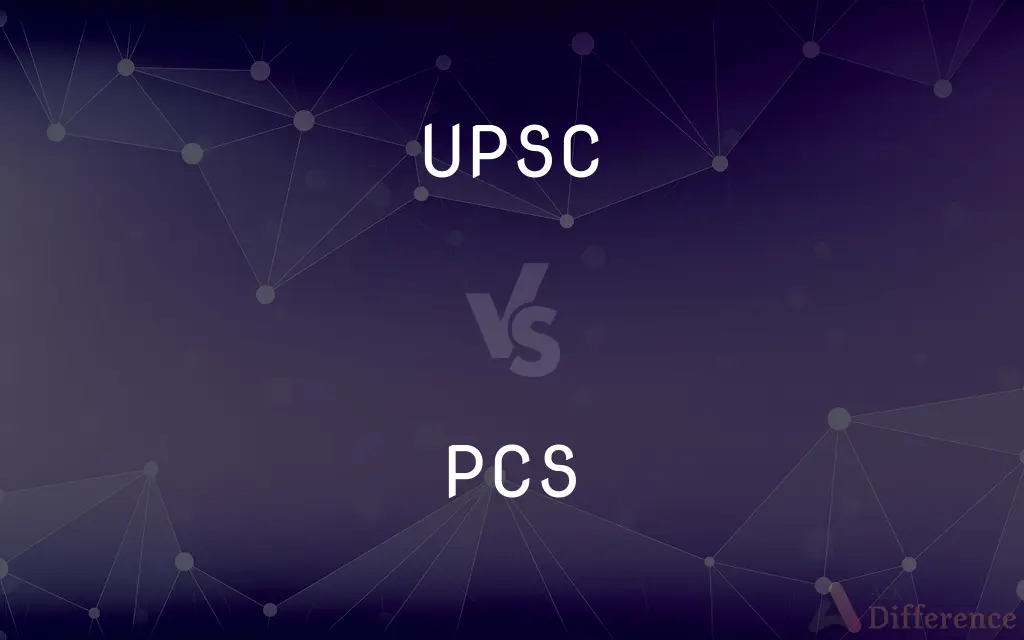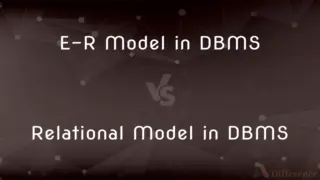UPSC vs. PCS — What's the Difference?
By Tayyaba Rehman — Published on January 12, 2024
UPSC (Union Public Service Commission) is India's central agency conducting national-level exams; PCS (Provincial Civil Service) is a state-level civil service exam in Indian states.

Difference Between UPSC and PCS
Table of Contents
ADVERTISEMENT
Key Differences
UPSC and PCS are both crucial entities in the Indian administrative system, but they operate at different governmental levels. The UPSC, or Union Public Service Commission, is a central agency established by the Constitution of India. It's responsible for conducting examinations for all-India services and group A & group B of Central services. Conversely, PCS, which stands for Provincial Civil Service, is a state-level civil service. Each Indian state has its PCS exam for state-level administrative roles.
The examinations conducted by UPSC are deemed some of the toughest in India. They include the Civil Services Examination (CSE), which recruits candidates for the prestigious Indian Administrative Service (IAS), Indian Foreign Service (IFS), and Indian Police Service (IPS), among others. On the other hand, PCS exams are managed and executed by the respective state's Public Service Commission. They select candidates for various state government positions, such as the State Administrative Service and State Police Service.
From a jurisdictional perspective, officials selected through UPSC exams are posted across the country and can serve in any state, although they might have a specific cadre. They often hold roles that require coordination between the central and state governments. In contrast, PCS officers primarily serve within the state that conducts the examination. Their roles and responsibilities are more closely aligned with that particular state's governance and administrative needs.
Another point of distinction is the nature and structure of the examinations. While both UPSC and PCS exams are rigorous and follow a similar pattern of preliminary, mains, and interview rounds, the syllabus can differ. UPSC has a broader, all-India focus in its questions, while PCS exams might include topics specific to the history, geography, and socio-economic conditions of the state in question.
In terms of career progression, officers selected through the UPSC have opportunities to rise to very senior positions in the central government. They can even represent India internationally in diplomatic capacities. PCS officers, meanwhile, can advance to high-ranking positions within their state administration, with some even transitioning to the All India Services after a certain period.
ADVERTISEMENT
Comparison Chart
Level of Operation
Central agency of the Indian government.
Operates at the state level in Indian states.
Exam Focus
All-India services and central services.
State-level administrative roles.
Jurisdiction
Officers can be posted anywhere in India.
Officers primarily serve within the conducting state.
Syllabus Scope
Broader, all-India focus.
May include state-specific topics.
Career Progression
Can rise to senior central government roles.
Can advance within state administration; some transition to AIS
Compare with Definitions
UPSC
Established by the Constitution of India.
The role and function of UPSC is constitutionally mandated.
PCS
A state-level civil service examination in Indian states.
After clearing the PCS exam, he joined the state administrative service.
UPSC
Responsible for the Civil Services Examination.
UPSC conducts one of the toughest exams in India.
PCS
Recruits for state government administrative roles.
PCS officers play a crucial role in state governance.
UPSC
Oversees departmental examinations for government service promotions.
He took the UPSC departmental exam for his promotion.
PCS
Managed by the state's Public Service Commission.
The PCS exam is conducted annually by the state commission.
UPSC
India's central agency for recruitment to central government services.
She cleared the UPSC exam to join the IAS.
PCS
Examination pattern includes prelims, mains, and interviews.
She's preparing for the mains after clearing the PCS prelims.
UPSC
Handles recruitment for all-India and central services.
Through UPSC, candidates can join services like the IFS.
PCS
Focuses on state-specific administrative needs.
The PCS syllabus includes topics pertinent to the state's history.
PCS
Pieces
10 pcs per box
Common Curiosities
What are some exams under UPSC?
UPSC conducts the Civil Services Examination, Engineering Services Examination, among others.
What does UPSC stand for?
UPSC stands for Union Public Service Commission.
Is UPSC a constitutional body?
Yes, UPSC was established by the Constitution of India.
Who conducts the PCS exams?
Each state's Public Service Commission conducts the PCS exams.
Can UPSC officers serve outside India?
Yes, for instance, Indian Foreign Service (IFS) officers represent India abroad.
Which is considered tougher, UPSC or PCS?
Both are challenging, but UPSC is often seen as tougher due to its all-India competition scope.
Where do PCS officers serve?
PCS officers primarily serve in the state that conducts the exam.
How many attempts are allowed for UPSC exams?
The number of attempts varies based on category; e.g., General candidates get 6 attempts.
What roles does PCS cater to?
PCS caters to state-level administrative and governance roles.
Are PCS exams held annually?
Typically, yes. But the frequency can vary depending on the state's requirements.
How are UPSC and PCS syllabi different?
UPSC has an all-India focus, while PCS may include state-specific topics.
Can a PCS officer join All India Services later?
Yes, some PCS officers can transition to All India Services after fulfilling certain criteria.
Share Your Discovery

Previous Comparison
E-R Model in DBMS vs. Relational Model in DBMS
Next Comparison
FDM vs. TDMAuthor Spotlight
Written by
Tayyaba RehmanTayyaba Rehman is a distinguished writer, currently serving as a primary contributor to askdifference.com. As a researcher in semantics and etymology, Tayyaba's passion for the complexity of languages and their distinctions has found a perfect home on the platform. Tayyaba delves into the intricacies of language, distinguishing between commonly confused words and phrases, thereby providing clarity for readers worldwide.
















































